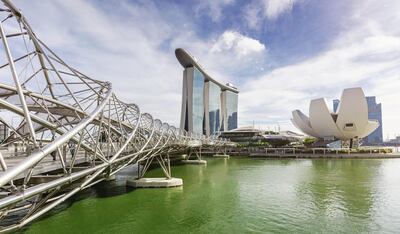The World Economic Forum annual meeting will have a distinctly different feel next year.
Instead of the snow-capped mountains of Davos, billionaire decision makers, hedge fund managers and rolling-news television crews will head to Singapore for May 13 to 16.
The city-state has been largely closed off to the world since the pandemic began and today has just 76 active cases.
In an announcement late on Monday, WEF chief Klaus Schwab said the decision was for the safety of delegates, as Switzerland battles a rising number of cases and cut off train routes to Italy this week.
But how does an event that sees global decision makers press the flesh work in the age of the coronavirus?
The challenge is, said Kamal Vaswani, Singapore's Ambassador to the UAE, to allow people to get together while "keeping Covid-19 in check and to host a safe, productive and successful meeting".
The first part of that is likely to mean testing for all attendees.
At the end of October, the city hosted Singapore International Energy Week (SIEW).
Like the WEF planned in May, the event was hybrid, mixing virtual discussions with in-house presentations at the luxury Marina Bay Sands hotel.
Visitors were tested for the virus prior to registration and were required to prove a negative test result to gain hotel access.
The WEF is likely to have similar restrictions.
But extra precautions will have to be taken.

Christopher Khoo of Singapore tourism consultancy MasterConsult Services said organisers would have to find a balance between restrictions and making the event worthwhile.
“In Davos, it is an opportunity to rub shoulders with somebody taking the lift or in the hotel lobby, and exchanging thoughts that way,” Mr Khoo told Reuters.
“How do you create those networking opportunities? That is a challenge.”
Singapore restricts conferences to 250 people, which are split into groups of 50 that cannot mingle.
The World Economic Forum at Davos usually hosts about 3,000 official participants but side meetings and network events and an influx of journalists sees the Alpine town's population swell from 10,000 to 30,000 each January.
How many will make the decision to fly to Singapore remains to be seen.
Officials said the health and safety of visitors would be a “top priority”.

“Covid-19 has affected many countries in the world, bringing global travel and events to a standstill," Chan Chun Sing, Minister for Trade and Industry, said on Monday.
"Singapore has not been spared and has been harder hit than many countries due to our lack of a domestic market.
“We will ensure the health and safety of our people and participants remain our top priority.”
The WEF plans to return to Davos, Switzerland in 2022.
Singapore has been hailed as a beacon of success in the way it has dealt with the pandemic with just 76 active cases of the virus.
Like many Asian nations, its experience of containing the Sars epidemic in 2002-04 proved invaluable when dealing with the Covid-19 outbreak.
Since the first coronavirus diagnoses in early February, just 29 people have died from 58,285 recorded cases.
The 12 new cases recently reported were imported infections from India, Indonesia, Malaysia and Myanmar. All but one were workers returning to the country and were placed on stay-home notices or isolated on arrival by the Ministry of Health (MOH).
Singapore has a similar demographic to the UAE, with the majority of residents expatriate workers.
After a spike in cases, the country went into full lockdown in April and May.
Restrictions during phase two of the nation’s response continue, such as one metre social distancing and the compulsory wearing of facemasks outside.
Flights in and out of Singapore remain tightly restricted.
A flight bubble between Singapore and Hong Kong would have allowed passengers to skip quarantine - but was suspended until at least the end of 2020 after a spike in cases in Hong Kong.
Its "green lane" measures allow business travellers from South Korea, Malaysia, China, Japan, Indonesia, Brunei and Germany to fly in, as long as they comply with a strict itinerary.
Short term visitors are not allowed into the country, while others are screened via safe traveller lanes at the airport and can apply in advance for an air travel pass.
A pass is granted once a long list of criteria is met such as a PCR tests on arrival and compulsory use of a government track and trace mobile app.
Inside the country, tourism and hospitality business has resumed but groups of people meeting are limited to five.
Large scale events are still restricted while working hours are staggered to reduce crowds during rush hour.
Facemasks have been mandatory since June when an eight-week circuit-breaker of intense restrictions to control the virus ended.
The country is keen to re-open business ties to kick-start the economy, with the WEF the largest event likely to be hosted in Singapore in 2021.
The city-state's economy shrank 42.9 per cent year-on-year during the second quarter of 2020 with support measures of S$8 billion (Dh21.5bn/$5.8bn) announced to cushion the blow from the coronavirus pandemic.
Wage subsidies have been extended and cash pumped in to the devastated aviation and hospitality sectors.


